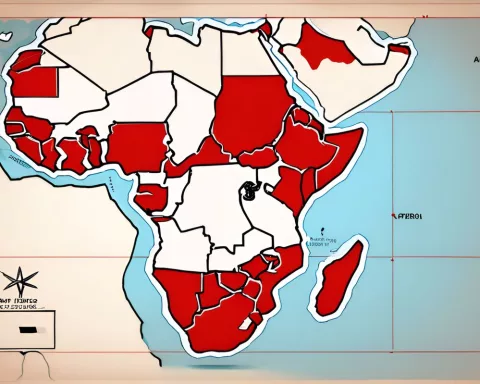Improved air access is crucial for economic growth and development in Africa, particularly in the tourism sector. The Single African Air Transport Market and the Yamoussoukro Decision are key to achieving sustainable growth in tourism, but partnerships between the aviation and tourism industries are necessary to address prevailing issues. The government policies and technological innovations, such as digital booking platforms and sustainable aviation fuels, must be leveraged to fuel the growth of the aviation industry and ensure safety and efficiency. Through proactive partnerships, Africa can craft its next success story and propel forward.
How can improved air access boost economic growth in Africa?
Improved air access can serve as a catalyst for economic growth and development throughout the African continent. The tourism sector, a lively engine of growth, plays an instrumental role in creating jobs, boosting infrastructure development, and contributing to the foreign exchange earnings of not just South Africa, but the entire African continent. However, sustainable growth in tourism hinges on one crucial but often ignored sector – the aviation industry. Partnerships between the aviation and tourism industries are crucial in addressing prevalent issues and achieving the Single African Air Transport Market and the Yamoussoukro Decision.
Unearthing the Economic Powerhouse: Tourism
In the throbbing core of KwaZulu-Natal, amidst the exquisite Valley of the Thousand Hills, we find ourselves at the core of the Africa Travel Indaba 2024. This platform underscores the need for improved air access as an essential catalyst for economic growth and development throughout the African continent. The tourism sector, a lively engine of growth, plays an instrumental role in creating jobs, boosting infrastructure development, and contributing to the foreign exchange earnings of not just South Africa, but the entire African continent.
It’s been underscored by the notable economic contribution of tourism, as evidenced by the fact that South Africa attracted 1.8 million visitors from other African nations between January and March 2024. This represented an impressive 74.5% of all arrivals. However, it’s essential to acknowledge that sustainable growth in tourism hinges on one crucial but often ignored sector – the aviation industry.
Embracing the Potential of the Airline Industry
The potential of exploring the captivating beauty of Pereybere Beach in Mauritius at sunrise, and relishing a sunset near the stunning Santa Isabel Cathedral in Equatorial Guinea on the same day, unveils the vast potential intrinsic to the African continent. However, the challenges of interconnecting African nations still persist. The key to moving forward lies in addressing these hurdles head-on.
A prominent proposed resolution involves fostering ties between the aviation and tourism industries to actualize the Single African Air Transport Market (SAATM) and the Yamoussoukro Decision. This would require forthright discussions and accountability with tangible and measurable results. The initiation of such dialogues began at the Aviation Summit led by South Africa’s Transport Minister Sindisiwe Chikunga and continues here. Partnerships are crucial in addressing the prevalent issues, such as infrastructure investment, promoting air connectivity, and facilitating travel for tourists. This is a reiteration of findings from the recent report by the World Travel and Tourism Council (WTTC) on Opportunities for Africa.
The Impact of Infrastructure: King Shaka International Airport
A shining example of these partnerships is the King Shaka International Airport. Despite the challenges it faces, the airport has continually strived to increase its traffic and establish itself as a significant destination. This involves continuous improvements in facilities and infrastructure, and providing support to airports in Zambia, Ghana, and several other regions. The Airports Company South Africa (Acsa) shares this objective, having invested R21.7 billion in airport infrastructure development in South Africa.
Navigating Challenges and Propelling Growth
The primary goal of today’s discussion is to pinpoint obstacles and devise practical solutions to augment air connectivity in Africa. The International Air Transport Association (IATA) report from January 2024 shows that in 2023, global air traffic had recovered to 94.1% of pre-pandemic levels. Although global aviation is on an upward trajectory, Africa still grapples with inadequate infrastructure, high operating costs, regulatory barriers, and restricted access to financing.
Current IATA data reveals that Africa only contributes a minor fraction to global air traffic, with intra-African travel accounting for a mere 20% of total air traffic on the continent. As the rest of the world is gearing up to enhance travel accessibility, it’s also imperative for Africa to simplify travel within and to the continent.
Therefore, it’s crucial to rethink development strategies in the tourism sector, encourage strategic public-private partnerships, promote investment in regional tourism, strengthen regional integration and cooperation, and refocus efforts to implement impactful projects.
Driving Innovation through Public-Private Partnerships
Innovative initiatives such as the Public-Private Partnership at Skukuza Airport in the Kruger National Park, praised by the World Bank for its innovativeness, serves as an inspiring model. Similarly, infrastructure cooperation at Hoedspruit Airport has successfully increased visitor traffic to the northern part of Kruger.
The Department of Tourism plays a crucial role in creating demand for airlines by marketing destinations and routes. The primary aim is to attract more tourists to travel within Africa and streamline their journey. In South Africa, the Department of Tourism is formulating plans to optimize Air Access marketing from a tourism perspective, with the objective of creating a unified air access strategy for South Africa.
Strategies implemented by entities such as Gauteng Air Access, Cape Town Air Access, Durban Direct, and the Airports Company South Africa (ACSA) are making notable strides in promoting air access to their respective cities and provinces. This coordinated approach, coupled with organizations such as the Tourism Business Council of South Africa (TBCSA) and the Board of Airline Representatives of South Africa (BARSA), forms the bedrock of our proposal to the Cabinet.
Harnessing Government Policies and Technological Innovations
Government policies undoubtedly play a key role in shaping air access in South Africa and Africa. It’s essential to comprehend how these policies can fuel the growth of the aviation industry while ensuring safety and efficiency. Additionally, it’s crucial to explore how Africa can progress by leveraging technological advancements like digital booking platforms, biometric security systems, and sustainable aviation fuels.
Emerging trends in the airline industry, such as the shift towards lower capacity and higher load factors, are resulting in positive outcomes, particularly in terms of higher yields, which bode well for the financial health of the industry. However, the impact on sustainable tourism growth remains a critical area of focus.
The Road Ahead: Writing Africa’s Next Success Story
The airline industry must recognize that its most vocal proponents are the Tourism Ministers. Their ambition is to see more flights, more occupied seats, and consequently, more tourism growth. It’s time to seize this opportunity and craft Africa’s next success story through proactive partnerships that adapt to market changes.
This is the juncture for a Pan-African dialogue on air access and sustainable tourism growth. This is the moment to propel Africa forward.
1. How can improved air access boost economic growth in Africa?
Improved air access can be a catalyst for economic growth in Africa, particularly in the tourism sector. The tourism industry plays an instrumental role in creating jobs, boosting infrastructure development, and contributing to foreign exchange earnings. Sustainable growth in tourism hinges on partnerships between the aviation and tourism industries, which can be achieved through the Single African Air Transport Market and the Yamoussoukro Decision.
2. What are the challenges faced by the airline industry in Africa?
The airline industry in Africa faces challenges such as inadequate infrastructure, high operating costs, regulatory barriers, and restricted access to financing. Africa only contributes a small fraction to global air traffic, with intra-African travel accounting for just 20% of total air traffic on the continent.
3. What is the Public-Private Partnership at Skukuza Airport in the Kruger National Park?
The Public-Private Partnership at Skukuza Airport in the Kruger National Park is an innovative initiative praised by the World Bank for its innovativeness. Similarly, infrastructure cooperation at Hoedspruit Airport has successfully increased visitor traffic to the northern part of Kruger. These partnerships serve as inspiring models for driving innovation through public-private partnerships.
4. How can government policies and technological innovations fuel the growth of the aviation industry in Africa?
Government policies play a crucial role in shaping air access in Africa and can fuel the growth of the aviation industry while ensuring safety and efficiency. Technological advancements like digital booking platforms, biometric security systems, and sustainable aviation fuels can also be leveraged to fuel growth.
5. What is the role of the tourism sector in creating demand for airlines?
The tourism sector plays a crucial role in creating demand for airlines by marketing destinations and routes. The aim is to attract more tourists to travel within Africa and streamline their journey. Strategies implemented by entities such as Gauteng Air Access, Cape Town Air Access, Durban Direct, and the Airports Company South Africa (ACSA) are making notable strides in promoting air access to their respective cities and provinces.
6. What is the way forward for air access and sustainable tourism growth in Africa?
The airline industry must recognize that its most vocal proponents are the Tourism Ministers, who aim to see more flights, more occupied seats, and more tourism growth. The solution lies in proactive partnerships between the aviation and tourism industries, adapting to market changes, and leveraging government policies and technological innovations.












